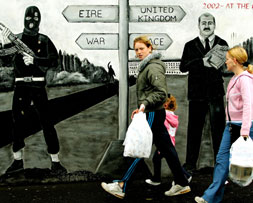Cross Border Cooperation
There are a growing number of incentives for both North and South to cooperate economically, and the once-powerful disincentives, particularly political differences, are proving less pertinent. Over the last decade, cross-border trade has increased to € 2.5 billion ($3.2 billion) in 2004, according to InterTradeIreland. The Good Friday Agreement of 1998, which provided for power-sharing between Protestants and Catholics in NI, also established several cross-border agencies, some to promote peace or tourism and others focused on fostering economic cooperation between the two Irelands. InterTradeIreland is just one such organization. It helps companies increase all-island sales, encourages cross-border partnerships, and matches up university researchers to businesses on both sides of the border.
Companies offering a wide variety of products and services, from cleaning solvents to uniforms or engineering consultations, are benefiting from the cross-pollination of know-how and the expansion of their respective domestic markets to include the entire island. In a survey by InterTradeIreland and the Economic and Social Research Institute (ESRI), one third of businesses indicated that they had either trading links or a plan for forging them. The most significant ties are in import or export, with stronger connections reported among companies along the border. Other cross-border activities include shared purchase of raw materials, joint marketing, and combined staff training.
Obstacles to All-Island Economics
InterTradeIreland’s Dominic Mullan, a project manager with Microtrade, advises small businesses on technical issues that sometimes discourage them from engaging in cross-border trade. One of the most frequently mentioned, he says, is the difference in currencies, with NI using the pound and the ROI using the euro. “People complain about fluctuations in currency, which mean they can sometimes lose out a little on deals,” says Mullan. “The currencies have been reasonably stable in recent years, so this has not been a big problem. You win some and you lose some.”
Though some businesses may initially be intimidated by currency, insurance, and various complications that arise from differences in labor laws, ultimately the potential money-making opportunities of an all-island market outweigh most obstacles. For example, when Glen Aine Foods, an ROI sausage maker, was looking for a contract fryer to meet a growing demand for pre-cooked products, it stumbled upon a new market for its meats. Glen Aine turned to Northern Omagh’s Crosh Valley Farm for its fryers and then the two companies distributed each other’s products to their respective markets. Today the northern Crosh Valley Farm fries four tons of Glen Aine sausages a week, distributing 20 percent to NI outlets. Glen Aine, in turn, distributes half a ton of Crosh Valley Farm’s bacon in the ROI.
Other obstacles cited by businesses include transportation and cultural differences. “The road network in Ireland is getting much better but is still limited,” says Mullan. “This can be a problem for businesses needing to make regular deliveries of goods. There are some internal flights now, which makes some forms of business much more doable. In the past, a business in Cork would never have chosen to do business in NI, but more recently, with a direct flight, this is now much more doable. We recently brought a group of Belfast businesses to Cork to meet with some other companies, and a number of them are now working together.” There are several plans under way to improve the joint infrastructure, including moves to create an all-island energy market to reduce costs and, significantly, a plan to spend billions over the next 10 years on all-island transportation, power, and communications. In the ROI, Irish Foreign Minister Dermot Ahern has instructed various government agencies that the 2007-2013 National Development Plan must be made from an all-island perspective.
While small firms dip Southern sausages in Northern deep fryers, technology sharing of a similar sort is happening in academia, where researchers are sharing their technical expertise with industries that need it. In InterTradeIreland’s Fusion program, researchers “from Dublin to Galway and Coleraine to Cork” are teaming up to tackle issues from food shelf life to cancer to shellfish waste. The program provides support for small businesses from NI to work with university researchers in the ROI (or vice versa). So, for example, a food science expert in the University College Cork might work with an NI food producer to see how they could maximize shelf life of products.
- Previous: Ulster Tiger Ready to Spring?
- Next: Stormont Stalemate



